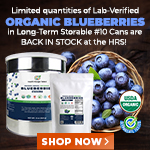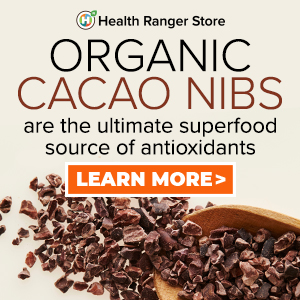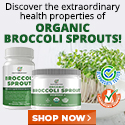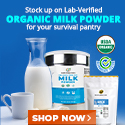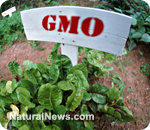
Did you know that 'natural' foods can still contain GMOs? The main difference between 'organic' and 'natural'
Thursday, July 26, 2012 by: Ben
Tags: natural foods, GMOs, organic
- Trump's Trojan Horse: How Stablecoins Are Secretly Paving the Way for a CBDC Control Grid – an Interview with Catherine Austin Fitts
- POOP CEMETERY: Bill Gates DEMANDS all humans STOP POOPING or bury it to save Earth from Sun’s ever-increasing heat
- THE AI RACE IS ALREADY WON: How China’s power dominance (and America’s climate lunacy surrender) secured its victory in the race to AI superintelligence
- Big Tech's culture war: Google buries Catholic voices opposing Pope Francis' reforms under vague “hate speech” claims
- New Hampshire court ruling puts TikTok’s design and free speech under fire
- DECENTRALIZED SPIRITUALITY and the true teachings of Christ: Overcoming the censorship, threats and lies of organized religion to truly know God and the Universal Christ
- U.S. military’s grenade-dropping drone “breakthrough” exposes dire lag in modern warfare
- J&J scientist explains that the company knew the shot was unsafe: “People wanted it, we gave it to them”
- Morphic resonance “remote viewing” reveals iconic Middle East images of stealth bombers, a falcon and a one-horned ram
- Thousands of US workers axed as freight, lumber, and beverage giants automate, abandon local economies, and discard American workers
- Trump's 'Genius Act' sparks fears of CBDC surveillance grid as conservatives warn of digital slavery
- J&J scientists had PRIOR KNOWLEDGE their COVID CLOT SHOTS were DEADLY and lacked proper research, but pushed them heavily anyhow
- Researchers identify top three BRAIN AGING risk factors
- U.K. government's secret cover-up highlights democratic crisis as truth becomes “unpublishable”
- Tips for cultivating black gold: How home composting transforms waste into life-giving soil
- Decentralize TV: Zano privacy crypto announces stunning new infrastructure achievements
- Eleven days before Iran bombed Tel Aviv, my microscope revealed haunting images of EXACTLY what would happen
- Wormwood: A bitter herb with incredible healing potential
- J&J scientist explains that the company knew the shot was unsafe: “People wanted it, we gave it to them”
- Trump's 'Genius Act' sparks fears of CBDC surveillance grid as conservatives warn of digital slavery
- U.K. government's secret cover-up highlights democratic crisis as truth becomes “unpublishable”
- Trump's Trojan Horse: How Stablecoins Are Secretly Paving the Way for a CBDC Control Grid – an Interview with Catherine Austin Fitts
- New Hampshire court ruling puts TikTok’s design and free speech under fire
- DECENTRALIZED SPIRITUALITY and the true teachings of Christ: Overcoming the censorship, threats and lies of organized religion to truly know God and the Universal Christ
- Eleven days before Iran bombed Tel Aviv, my microscope revealed haunting images of EXACTLY what would happen
- Morphic resonance “remote viewing” reveals iconic Middle East images of stealth bombers, a falcon and a one-horned ram
- Amazing microscopy photos reveal how freezing crystals attempt to mimic electronic structures they are touching
- EPA confirms existence of GEOENGINEERING programs, validating long-held public concerns
- Leaked messages expose billionaire’s fury: Universities now facing $5B donor revolt after ‘declaring war on 70% of America’
- Fermented cabbage: The ancient superfood that heals your gut and mind
- Botulism from homemade nopal salad sends 10 to hospital in California
- Vitamin C transforms skin renewal by activating genetic youth, study reveals
- INSIDIOUS ISRAELI SCIENTISTS design "Black Death" mutant plague mRNA injections that turn human cells into Frankenstein mutations
- If Rep. Thomas Massie can get this new legislation passed, Covid-19 VACCINE MAKERS will be liable for injuries and deaths caused by DEADLY CLOT SHOTS
- HEALTH SECRETS: How to Instantly Block MSG Toxicity Using Natural Substances (and the secret of Methylene Blue)
- Exploring the depths of alternative medicine: A comprehensive review of “The Gale Encyclopedia of Alternative Medicine”
- Eleven days before Iran bombed Tel Aviv, my microscope revealed haunting images of EXACTLY what would happen
- DECENTRALIZED SPIRITUALITY and the true teachings of Christ: Overcoming the censorship, threats and lies of organized religion to truly know God and the Universal Christ
- Morphic resonance “remote viewing” reveals iconic Middle East images of stealth bombers, a falcon and a one-horned ram
- Amazing microscopy photos reveal how freezing crystals attempt to mimic electronic structures they are touching
- HEALTH SECRETS: How to Instantly Block MSG Toxicity Using Natural Substances (and the secret of Methylene Blue)
- EPA proposes repeal of climate regulations on power plants: A new era for energy policy
- Injecting chemicals is MORE DANGEROUS than eating them, so why is polysorbate 80 banned in ICE CREAM but allowed in VACCINES?
- Exploring the depths of alternative medicine: A comprehensive review of “The Gale Encyclopedia of Alternative Medicine”
- Poll: Overwhelming majority of Americans demand Big Pharma ACCOUNTABILITY for vaccine injuries
- New Jersey on verge of expanding ELECTRONIC VACCINE REGISTRY, suspending consent during “public health emergencies”
- Shingles surge sparks new focus on holistic care: Tackling pain, immunity and risks
- ORWELLIAN CONTROL MACHINE: Again, CDC screaming for everyone to mask up on flights to flatten new Covid curve and push clot-shot VACCINATIONS
- Germany signals shift in Ukraine strategy: A diplomatic end to the conflict?
- New insights into how different sugars harm health
- “Healing Revolution” on BrightU: The truth about addiction and how you can use urology to heal
- Los Angeles Mayor Karen Bass signs executive order that seeks to revive Hollywood
- Blueberries and potatoes join EWG’s “Dirty Dozen”: The dirty truth about pesticides lurking in produce
- MSG EXPOSED: Hidden Neurotoxins Found in Groceries, Snacks and Popular Fast Food Menus
- Red Cross issues warning to stop blood plasma donations from vaccinated people
- EPA advisor admits the agency is funneling billions to climate groups ahead of Trump’s return to White House
- Scientists confirm: GENIUS brain function can be spontaneously unleashed in humans without any apparent cause
- HYSSOP: What research reveals about the health benefits of this ancient holy herb
- Newly released JFK files reveal Pentagon's role in creating Lyme disease and covid in the same lab
- Two containers with completed ballots fall out of truck in Florida
- Mike Adams releases country western hit single: Goin’ Back in Time is Comin’ Home
- Global leaders unite to clamp down on “misinformation” with UN-backed Cascais Declaration
- I Want My Bailout Money – new song released by Mike Adams
- Michael Yon warns of a ZIONIST TAKEOVER in Trump’s second administration
- BOMBSHELL: DNA testing kits are a SCAM to develop ethnic-specific bioweapons
- HEALTH SECRETS: How to Instantly Block MSG Toxicity Using Natural Substances (and the secret of Methylene Blue)
- The Health Ranger releases “Vaccine Zombie” song and music video, using AI-animated zombies for the music video
- Morphic resonance “remote viewing” reveals iconic Middle East images of stealth bombers, a falcon and a one-horned ram
- BOMBSHELL: Covid-19 mRNA nanoparticles EMIT LIGHT SIGNALS that communicate MAC addresses used for self-assembly inside the blood vessels
- Israeli soldiers accused of even more torture and abuse in the West Bank
- RFK Jr. clears key hurdle: Sen. Susan Collins backs controversial HHS nominee, signaling a new era for health policy
- Sermon 30: How Jesus reveals Caesar’s FAKE CURRENCY and FALSE AUTHORITY
When it comes to "natural" and "organic," there is a main difference you need to be aware of. One is strictly regulated and the other label can mean, well just about anything.
An organic label means that the product is strictly regulated by the U.S. Department of Agriculture (USDA). This is good news for all you "organic" shoppers, it means that organic products are regulated from start to finish, assuring that it doesn't contain certain ingredients found in non-organic foods and products. The USDA says that organic food has to be grown without toxic, synthetic pesticides and herbicides, GMOs, and antibiotics or artificial growth hormones. It also helps that organic farms do not add chemicals to the air, water, and soil. There have been studies that show organic farming also helps produce more nutrient-dense crops.
As far as "natural," it is a bit more open ended. In fact, it is all the way open ended. The "natural" labels are not strictly defined or regulated. It could mean that the food doesn't contain preservatives, or that it is minimally processed, and it could mean none of those things. It is important to know that "natural" foods could even contain toxic chemicals and GMOs as they are not regulated like "organic" foods. Hence, it becomes that much more important to know how to read labels and understand what is being put in the products you purchase.
Natural and organic have two different definitions, and it is important to know the difference. Many companies are finding that just by adding "natural" to a label makes it more appealing to the consumer; however, it may not be more beneficial to your health. The bottom line is that organic food is the best choice for your health with its heavily regulated requirements and guidelines.
Sources for this article include:
http://www.motherjones.com
http://www.dietsinreview.com
http://www.jsonline.com
About the author:
Ben enjoys writing about the benefits of green tea at Tendig.com, a revenue sharing site that publishes unique and interesting articles.
Natural foods at FETCH.news
Get independent news alerts on natural cures, food lab tests, cannabis medicine, science, robotics, drones, privacy and more.
Take Action: Support Natural News by linking to this article from your website
Permalink to this article:
Embed article link: (copy HTML code below):
Reprinting this article:
Non-commercial use OK, cite NaturalNews.com with clickable link.
Follow Natural News on Facebook, Twitter, Google Plus, and Pinterest
Science News & Studies
Medicine News and Information
Food News & Studies
Health News & Studies
Herbs News & Information
Pollution News & Studies
Cancer News & Studies
Climate News & Studies
Survival News & Information
Gear News & Information
News covering technology, stocks, hackers, and more



"Big Tech and mainstream media are constantly trying to silence the independent voices that dare to bring you the truth about toxic food ingredients, dangerous medications and the failed, fraudulent science of the profit-driven medical establishment.
Email is one of the best ways to make sure you stay informed, without the censorship of the tech giants (Google, Apple, Facebook, Twitter, YouTube, etc.). Stay informed and you'll even likely learn information that may help save your own life."
–The Health Ranger, Mike Adams













